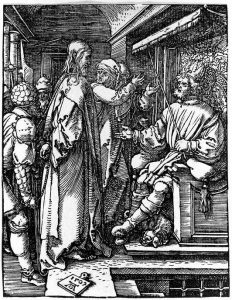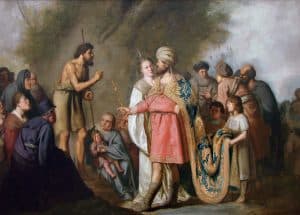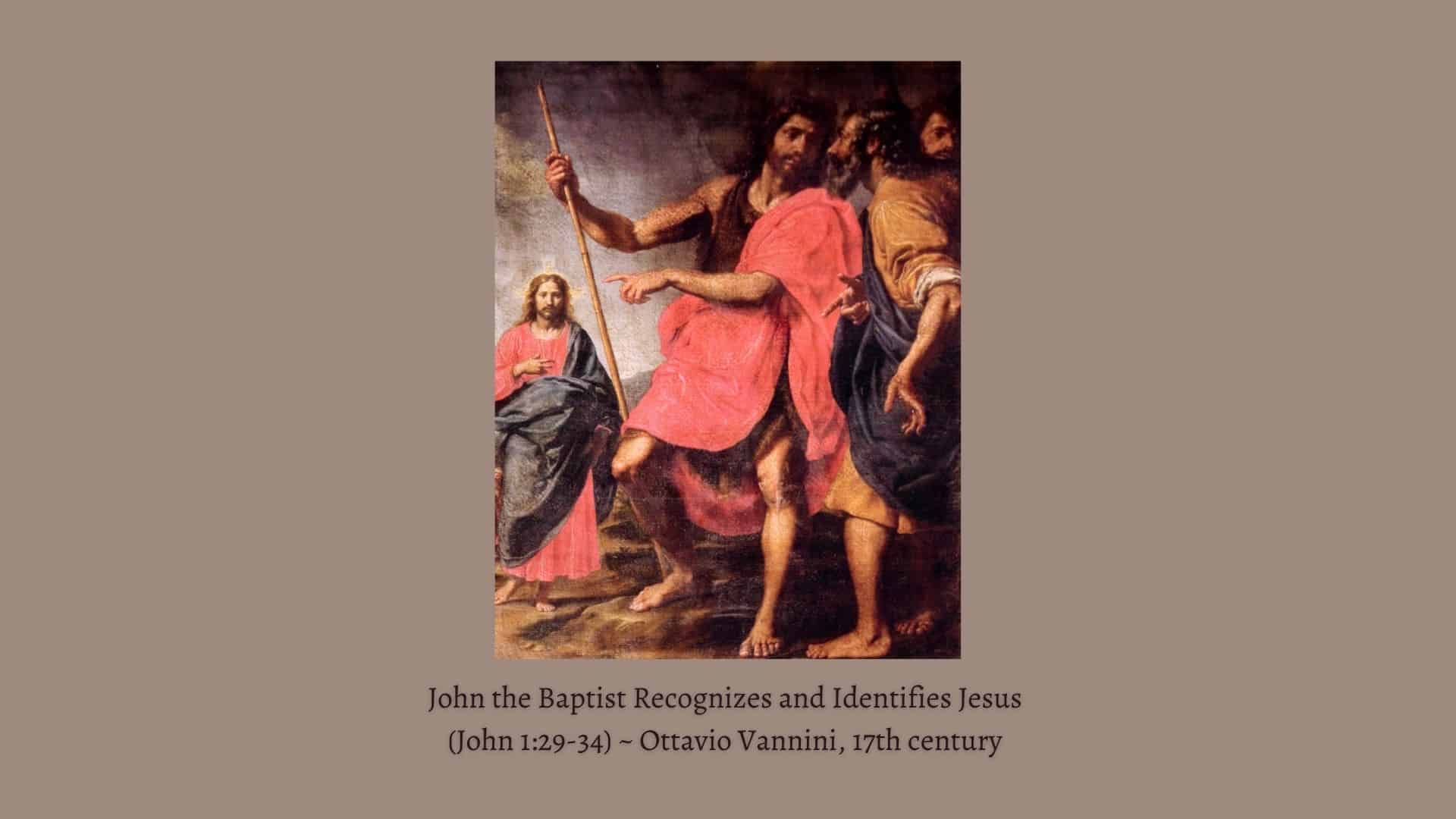Mark 6:14-29 gives us a record of how John the Baptist died.
14 Now King Herod heard of Him, for His name had become well known. And he said, “John the Baptist is risen from the dead, and therefore these powers are at work in him.”
15 Others said, “It is Elijah.”
And others said, “It is the Prophet, or like one of the prophets.”
16 But when Herod heard, he said, “This is John, whom I beheaded; he has been raised from the dead!” 17 For Herod himself had sent and laid hold of John, and bound him in prison for the sake of Herodias, his brother Philip’s wife; for he had married her. 18 Because John had said to Herod, “It is not lawful for you to have your brother’s wife.”
19 Therefore Herodias held it against him and wanted to kill him, but she could not; 20 for Herod feared John, knowing that he was a just and holy man, and he protected him. And when he heard him, he did many things, and heard him gladly.
21 Then an opportune day came when Herod on his birthday gave a feast for his nobles, the high officers, and the chief men of Galilee. 22 And when Herodias’ daughter herself came in and danced, and pleased Herod and those who sat with him, the king said to the girl, “Ask me whatever you want, and I will give it to you.” 23 He also swore to her, “Whatever you ask me, I will give you, up to half my kingdom.”
24 So she went out and said to her mother, “What shall I ask?”
And she said, “The head of John the Baptist!”
25 Immediately she came in with haste to the king and asked, saying, “I want you to give me at once the head of John the Baptist on a platter.”
26 And the king was exceedingly sorry; yet, because of the oaths and because of those who sat with him, he did not want to refuse her. 27 Immediately the king sent an executioner and commanded his head to be brought. And he went and beheaded him in prison, 28 brought his head on a platter, and gave it to the girl; and the girl gave it to her mother. 29 When his disciples heard of it, they came and took away his corpse and laid it in a tomb.
Here is how the 1977 mini-series Jesus of Nazareth depicts John’s condemnation of Herod’s immoral actions. Note that the Bible tells us John confronted Herod himself; he may not have publicly condemned him as portrayed here. Even so, John was vocal regarding his disapproval and his challenge to Herod to repent.
Which Herod Had John Beheaded?

In the New Testament, five or six different rulers from the same family dynasty are mentioned and frequently are referred to as Herod. The Herod involved here was Herod Antipas. This is the same Herod before whom Jesus would appear in Luke 23.
An article at gotquestions.org states that four different Herods are mentioned in the New Testament, but there is apparently more than one way to count the number of Herods mentioned in the Gospels and and Acts. The primary focus of the article, is Herod Antipas, and it offers some fascinating details about this ruler who ordered the beheading John the Baptist:
Herod Antipater (nicknamed Antipas) became tetrarch of Galilee and Perea upon the death of his father Herod the Great (Herod I). A tetrarch is a “ruler of one quarter,” as he receives one fourth of his father’s kingdom. Herod Antipas ruled as a Roman client and was responsible for building projects including the capital city of Tiberius on the Sea of Galilee. Herod Antipas is the Herod mentioned most often in the New Testament, and, with the exception of Herod the Great mentioned in Matthew 1 and Luke 1 and 2, every mention of Herod in the gospels refers to Herod Antipas.
Herod Antipas divorced his first wife to marry Herodias, who had been the wife of his half-brother Philip the tetrarch. According to Josephus the two fell in love and made plans to get married while Antipas was visiting with his brother Philip. John the Baptist began his ministry during the reigns of Philip and Antipas (Luke 3:1). In the course of his fiery preaching and denunciation of sin, he “rebuked Herod the tetrarch because of his marriage to Herodias, his brother’s wife, and all the other evil things he had done, [and] Herod added this to them all: He locked John up in prison” (Luke 3:19–20).
Theologian Warren Wiersbe explains,
Herod Antipas had married the daughter of King Aretas IV and then had divorced her so he could marry Herodias, the wife of his half brother, Herod Philip. It was a wicked alliance that was contrary to the Law of Moses (Lev. 18:16; 20:21), and the fearless John the Baptist had denounced the king for his sins. When Herod heard about the wonderful works of Jesus, he was sure that John the Baptist had come back from the dead to haunt him and condemn him! Herod’s conscience was bothering him, but he was unwilling to face his sins honestly and repent.
At this point [Mark 6:17-26], Mark shifted into a flashback to explain how John the Baptist had been cruelly and unjustly slain. Even in this brief account, we sense the tension in the palace, for Herod feared John, privately listened to him preach, and was in a state of perplexity over what he should do. “Queen” Herodias, on the other hand, hated John, wanted to kill him, and patiently waited for the most convenient time.1

Even John the Baptist Doubted
After John was thrown in prison for offending Herod, he began to have doubts about Jesus and asked two of his disciples to go directly to Jesus for information about who He really was. Bible scholar William Hendriksen writes,
According to [Matthew] 4:12 and 14:3,4…John the Baptist had been taken into custody by King Herod Antipas.…Though his imprisonment must have been a very grim ordeal, John was allowed to receive visitors. From these he had learned about the activities of Jesus, the very One about whom the baptist had said so many wonderful things (Matt. 3:11; John 1:15-18,26,27, 29-36; 3:28-30). As John saw it, the gracious words that fell from the lips of the Savior and the miracles of mercy he performed did not harmonize with the manner in which he, the Baptist, had pictured him before the public. He had presented him as One who had come to punish and destroy (Matt. 3:7,10; Luke 3:7,9).2
John was right, says Hendriksen, for his insights were of God (Luke 1:76;3:2). Yet because John’s these insights about the Lord related to Jesus’ second coming rather than His first, John understandably had failed to fully understand.3
Hendriksen continues, affirming John the Baptist’s taking the initiative to find out from Jesus Himself, as best he could, given his imprisonment, who Jesus really was.4 Doubts that remain unaddressed can quickly lead to unbelief; but when doubts are examined and properly
Jesus Responds
In Matthew 11:2-19 we learn of Jesus’ response to John’s inquiry — and significantly, we learn a great deal more.
2 And when John had heard in prison about the works of Christ, he sent two of his disciples 3 and said to Him, “Are You the Coming One, or do we look for another?”
4 Jesus answered and said to them, “Go and tell John the things which you hear and see: 5 The blind see and the lame walk; the lepers are cleansed and the deaf hear; the dead are raised up and the poor have the gospel preached to them. 6 And blessed is he who is not offended because of Me.”
7 As they departed, Jesus began to say to the multitudes concerning John: “What did you go out into the wilderness to see? A reed shaken by the wind? 8 But what did you go out to see? A man clothed in soft garments? Indeed, those who wear soft clothing are in kings’ houses.9 But what did you go out to see? A prophet? Yes, I say to you, and more than a prophet. 10 For this is he of whom it is written:
‘Behold, I send My messenger before Your face,
Who will prepare Your way before You.’
11 “Assuredly, I say to you, among those born of women there has not risen one greater than John the Baptist; but he who is least in the kingdom of heaven is greater than he. 12 And from the days of John the Baptist until now the kingdom of heaven suffers violence, and the violent take it by force. 13 For all the prophets and the law prophesied until John.14 And if you are willing to receive it, he is Elijah who is to come. 15 He who has ears to hear, let him hear!
16 “But to what shall I liken this generation? It is like children sitting in the marketplaces and calling to their companions, 17 and saying:
‘We played the flute for you,
And you did not dance;
We mourned to you,
And you did not lament.’
18 For John came neither eating nor drinking, and they say, ‘He has a demon.’ 19 The Son of Man came eating and drinking, and they say, ‘Look, a glutton and a winebibber, a friend of tax collectors and sinners!’ But wisdom is justified by her children.”
What We Can Learn About Pietism from these Passages
Note from Matthew 11:2-19 that Jesus not only sent reassuring words back to John; He also affirmed John’s ministry and work. Read again Matthew 11:7-15.
7 As they departed, Jesus began to say to the multitudes concerning John: “What did you go out into the wilderness to see? A reed shaken by the wind? 8 But what did you go out to see? A man clothed in soft garments? Indeed, those who wear soft clothing are in kings’ houses.9 But what did you go out to see? A prophet? Yes, I say to you, and more than a prophet. 10 For this is he of whom it is written:
‘Behold, I send My messenger before Your face,
Who will prepare Your way before You.’
11 “Assuredly, I say to you, among those born of women there has not risen one greater than John the Baptist; but he who is least in the kingdom of heaven is greater than he. 12 And from the days of John the Baptist until now the kingdom of heaven suffers violence, and the violent take it by force. 13 For all the prophets and the law prophesied until John.14 And if you are willing to receive it, he is Elijah who is to come. 15 He who has ears to hear, let him hear!
Questions for Reflection and Discussion
-
-
- How might the answer Jesus gave to John’s disciples to take back to John have reassured him?
- How did Jesus affirm John in his statements in Matthew 11:7-15?
- What did John do that got him into trouble? Why do you think he did it?
- It is clear from Scripture that John was correct in what he told Herod. (Note that the Bible tells us John had confronted Herod himself; he may not have publicly condemned him as portrayed Jesus of Nazareth.) What points might we emphasize to make the case that John was right to confront Herod as he did?
- Apart from the often-stated principle that pietists hold that God’s spokesmen should not address political issues because they’re political, not spiritual, what points might someone emphasize in making the case that John should not have confronted Herod? How valid are these?
- Why might God have wanted John to confront Herod about His sin, despite the risk and the cost John eventually would pay for doing so?
- Who is in a better position to confront political leaders about their sins, and the sins of the nation, thank God’s spokesmen — preachers and pastors?
- Ask someone to read Romans 13:1-7 and another to read 1 Peter 2:13-17. Do these passages say that rulers can do anything the want? No. There is much to sift through in these passages, but for now, note that careful readings of both of these passages indicate the authority God gives to the state is limited, specific, and delegated. In other words, rulers are accountable to God and have the responsibility to respect, honor, and enforce God’s law. When they abuse God’s law, they need to be reminded that they have abused the authority God has given them, and that God will hold them accountable.
- Respond to these observations. What conclusions might we draw from them?
-
-
-
-
- Jesus could have chided John for confronting Herod and for being involved in politics, but He did not.
- Jesus could have chided John for offending Herod and for not being “winsome,” but He did not.
- Instead of criticizing John, Jesus praised him.
- Significantly, even though John’s confrontation of Herod appealed to God’s moral law and Jesus had come to usher in an “age of grace,” apparently Jesus was OK with John’s holding Herod’s feet to the fire with regard to God’s moral law. What does this say, if anything, about God’s moral law in the age of grace?
-
-
Copyright © 2022 by B. Nathaniel Sullivan. All rights reserved.
Notes:
1Warren Wiersbe, The Bible Exposition Commentary, Vol. 1: Matthew–Galatians, (Wheaton, IL: Victor Books, 1989), 131.
2William Hendriksen, The Gospel of Matthew, (Grand Rapids: Baker Book House, 1973), 483.
3Hendriksen, 483-484.
3Hendriksen, 484.
